Lesson49(知识清单)新概念英语第一册
新概念第一册Lesson49-50

tell sb to do sth. 告诉某人做某事 1.Tom的妈妈告诉他去清洁卧室。 Tom's mom tells him to clean the bedroom. 2.我的姐姐告诉我去买一些牛排。 My sister tells me to buy some steak.
3.老师告诉我们去做我们的家庭作业。 The teacher tells us to do our homework. 4.她的妈妈告诉她不要看电视。 Her mother tells her not to watch TV.
eg. The teacher tell you to remember this sentence. You should tell him to clean the floor.
1. 我妈妈叫我去做作业。 eg. My mother tell me to do the homework.
tell sb not to do sth. 告诉某人不要做某事 eg. My father tell me not to play the computer
Text
• BUTCHER: Do you want any meat today, Mrs.Bird?
• MRS. BIRD: Yes, please. • BUTCHER: Do you want beef or lamb? • MRS. BIRD: Beef,please. • BUTCHER: This lamb's very good. • MRS. BIRD: I like lamb, but my
1.我要给孩子们讲这个故事。 eg. I will tell the children this story.
最新新概念英语49课讲义

Lesson49 At the butcher’s. 在肉店一、课文中重要单词meat: n. (食用)肉(不可数名词)Do you eat meat every day? 你每天都吃肉吗?Yes, I do. / No, I don’t.beef: n. 牛肉(不可数名词)There isn’t any beef on the plate. 盘子中没有什么牛肉。
lamb: n. 羔羊肉,小羊肉(不可数名词)He doesn’t like lamb, either. 他也不喜欢羔羊肉。
husband: n. 丈夫wife: n.妻子steak: n. 牛排How do you like your steak?你想要什么样的牛排?steak rare:半生的牛排;steak medium:半熟的牛排; steak well-done(全熟的牛排)mince: n. 肉馅(不可数名词)She wants some mince. 她想要一些肉馅。
chicken: n. 鸡,鸡肉There are some chickens behind the house.在房子后面有一些小鸡。
What do you want? 你想要点什么?I want some chicken. 我想要一些鸡肉。
tell: v. 告诉:掌握与tell相关的几个词的用法:speak + 语言:speak Chinese 说汉语/ speak English 说英语/ speak French 说法语talk: 谈话,交谈I want to talk to you. 我想和你谈一谈。
Say: 说(强调说的内容)He always says that he is a good man.他总是说他是一个好男人。
truth: n. 实情,真相; tell the truth 说实话,告诉真相;find out the truth 找到真相;either: adv. 也(用于否定句)too用于肯定句和疑问句中。
新概念第一册49课课件

详细描述
在课堂互动游戏中,学生可以通过参与游戏的方式学习课程内容,例如通过单词接龙、猜谜语等方式 巩固所学词汇和语法知识。这种方式可以让学生在轻松愉快的氛围中学习,提高学习效果。
THANKS
填空题2
请根据所给图片填写合适的英文 单词。图片中是一张正在听音乐的 CD,应填写“listening”。
翻译题
翻译题1
请将中文句子“我正在读书”翻译成英文。正确的英文句子 是“I am reading a book”。
翻译题2
请将中文句子“他正在游泳”翻译成英文。正确的英文句子 是“He is swimming”。
03
扩展阅读
相关文章推荐
01
02
49课详 解》
文章2
《新概念英语第一册49课的 语法重点》
文章3
《新概念英语第一册49课的 词汇解析》
文章4
《新概念英语第一册49课与 生活实际联系》
背景知识介绍
01
02
03
英语国家文化背景
介绍与新概念第一册49课 相关的英语国家文化背景, 如风俗习惯、历史背景等。
重点词汇
important: 重要的
please:请
would:愿 意
shall:应该
could:可 以
let:让
语法点解析
本课重点讲解了“请求”和“建议”的表达方式,包括使用情态动词“could”、 “would”、“shall”和“let”等。
通过例句和练习,让学生掌握这些情态动词在表达请求和建议时的用法和区别。
选择题
D. This is a yellow house. 选择题2: 请从下列四个选项中选出与图片匹配的英文单词。
新概念英语第一册第49课学习资料
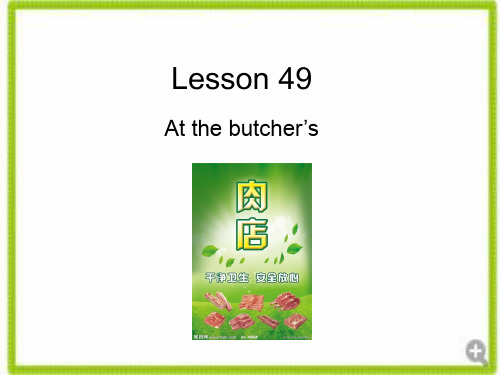
morning? 4.What______(do) he ______(do) in the evening? 5.Danny ________(study) English, Chinese,
Lesson 49
At the butcher’s
ห้องสมุดไป่ตู้ Review
• like • want • ripe • choice • pure • fresh
butcher n. 卖肉的,屠夫
• at the butcher’s • at the + 职业’s • 诊所 • at the doctor’s • 老师办公室 • at the teacher’s
truth n. 实情
• to tell you the truth • 告诉你实话吧,我不想刷碗。 • To tell you the truth, I don’t want to wash
the dishes.
either adv. 也
• 用于否定句,表示“也”,用于句尾 • 我也不喜欢牛排。 • I don’t like steak ,either. • 他们也不喜欢羊肉。 • They don’t like lamb ,either.
The End
teach-teaches ,watch-watches
4、以“o”结尾的动词,加“es”, go-goes ,do-does
她喜欢莴苣。
• She likes lettuce. • She doesn’t like lettuce. • Does she like lettuce? • Yes, she does. • No, she doesn’t.
Lesson49(知识清单)新概念英语第一册

新概念英语第一册Lesson 49笔记单词讲解:❥❥butcher ['bʊtʃə] n. 卖肉者at the butcher's 在肉店at the doctor's 在诊所at the hairdresser's 在理发店at the baker's 在面包店go to the butcher's 去肉店这里都省略了shopThe butcher is cutting the meat. 屠夫正在切肉。
The butcher's knife is very sharp. 屠夫的刀特别锐利。
❥❥meat [miːt] n. (食用〕肉(不行数名词〕pork [pɔːk] n. 猪肉I don't eat meat. 我不吃肉。
beer [bɪə] n. 啤酒❥❥lamb [læm] n. 小羊;羔羊肉mutton ['mʌtn] n. 羊肉❥❥husband ['hʌzbənd] n. 丈夫husband and wife: 夫妻exhusband: 前夫He's a good husband and father. 他是一个好丈夫和父亲。
夫妻之间的称呼:honey dear darling baby sweetheart❥❥steak [steɪk] n. 牛排a piece of steak 一块牛排How do you like your steak?你想怎样吃你的牛排?Steak rare/medium/welldone.生些/五分熟/全熟。
❥❥mince [mɪns] n. 肉馅I want a pound of mince, because I want to make some dumplings. 我想要一磅肉末,由于我想做一些饺子。
❥❥chicken ['tʃɪkɪn] n.鸡;鸡肉hen [hen] n. 母鸡cock [kɒk] n. 公鸡❥❥tell [tel] v. 告知tell sb. sth. 告知某人某件事tell the truth: 说实话tell a story: 讲故事tell a joke: 讲笑话She's telling a story to the children. 她正在给孩子们讲故事。
裕兴新概念英语第一册笔记:Lesson 49 At the butcher

Lesson 49 At the butcher'sNew words and expressions:butcher n. 卖肉者meat n.(食用)肉beef n.牛肉lamb n. 羔羊肉husband n.丈夫steak n.牛排mince n.肉馅,绞肉chicken n.鸡tell v.告诉truth n.实情either adv.也(用于否定句)butcher n. 卖肉的人,屠夫meat n.(食用)肉(不可数名词)eg.Mr. Green likes meat very much. 格林先生非常喜欢吃肉。
eg. Do you eat meat every day? 你每天都吃肉吗?--- Yes, I do. 是的。
--- No, I don't. 不。
beef n.牛肉(不可数名词)eg. There isn't any beef on the plate. 盘子中没有什么牛肉。
eg.My parents don't like beef. 我的父母不喜欢吃牛肉。
lamb n. 羔羊肉,小羊肉eg. I don’t like lamb. 我不喜欢吃羔羊肉。
eg. He doesn't like lamb, either. 他也不喜欢羔羊肉。
husband n.丈夫wife 妻子spouse 夫妻bride n.新娘groom n.新郎fiancee 未婚妻fiance 未婚夫girlfriendboyfriendsteak n.牛排steak raresteak mediumsteak well-doneeg. How do you like your steak?Steak rare/medium/well-done.mince n.肉馅(不可数名词)eg. She wants some mince. 她想要一些肉馅。
eg. She doesn't want any mince. 她不想要一些肉馅。
新概念英语第一册学习手册【Lesson49、51、53】
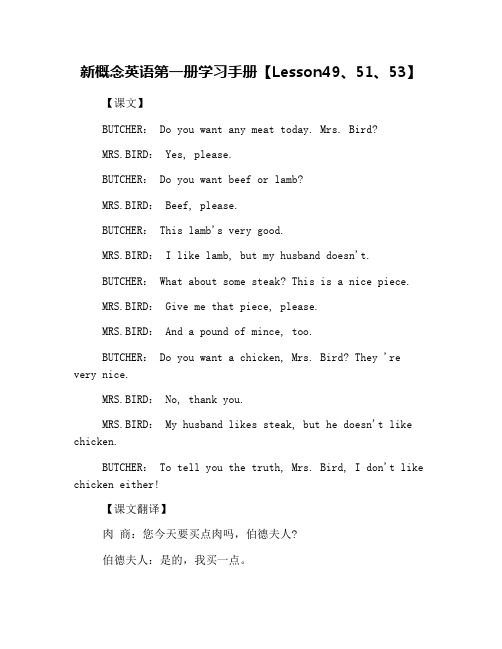
新概念英语第一册学习手册【Lesson49、51、53】【课文】BUTCHER: Do you want any meat today. Mrs. Bird?MRS.BIRD: Yes, please.BUTCHER: Do you want beef or lamb?MRS.BIRD: Beef, please.BUTCHER: This lamb's very good.MRS.BIRD: I like lamb, but my husband doesn't.BUTCHER: What about some steak? This is a nice piece.MRS.BIRD: Give me that piece, please.MRS.BIRD: And a pound of mince, too.BUTCHER: Do you want a chicken, Mrs. Bird? They 're very nice.MRS.BIRD: No, thank you.MRS.BIRD: My husband likes steak, but he doesn't like chicken.BUTCHER: To tell you the truth, Mrs. Bird, I don't like chicken either!【课文翻译】肉商:您今天要买点肉吗,伯德夫人?伯德夫人:是的,我买一点。
肉商:您要牛肉还是要羔羊肉?伯德夫人:请给我牛肉。
肉商:这羔羊肉很好。
伯德夫人:我喜欢羔羊肉,可我丈夫不喜欢。
肉商:来点牛排吗?这块很好。
伯德夫人:就请给我那块吧。
伯德夫人:再来一磅绞肉。
肉商:您要买只鸡吗,伯德夫人?这些鸡很好。
伯德夫人:不要了,谢谢。
伯德夫人:我丈夫喜欢牛排,但他不喜欢鸡。
肉商:说老实话,伯德夫人,我也不喜欢鸡。
【生词】butcher n. 卖肉的meat n. (食用)肉beef n. 牛肉lamb n. 羔羊肉husband n. 丈夫steak n. 牛排mince n. 肉馅,绞肉chicken n. 鸡tell v. 告诉。
新概念英语第1册课程讲义Lesson49-50

Lesson 49 单词讲解1. butcher: 卖肉的at the butcher’s:在肉店at the doctor’s:在诊所at the hairdresser’s:在理发店at the bak er’s:在面包店……2. meat: 肉,不可数名词3. beef: 牛肉4. lamb : 羔羊肉mutton: 羊肉5. steak: 牛排a piece of steak6. mince: 肉馅7. chicken: 鸡肉8. pork: 猪肉a pound of …9. husband : 丈夫10. tell: 告诉tell sb. sth. 告诉某人某件事11. truth: 实情、事实true: adj. 真实的12. either: 也,too: 也,陈述句,疑问句我也不知道。
I don’t know either.你也喜欢英语吗?Do you love English, too?Lesson 49 课文讲解1. Do you want any meat…?Are you…?Do you…?Are you+ 非动词?Do you + 动词?Are you…?Do you…?_____________ busy?_____________ a teacher?_____________ at home?_____________ sleep well?_____________ make thebed?_____________ havebreakfast?Are you…?Do you…?I s she\he\it…?Does she\he\ it…?_____________ tall?_____________ a boss?_____________ in Beijing?_____________ swim well?_____________ wash your hands?_____________ walk to school?先看词性: 再看人称:Are you…?Do you…?Is she\he\it…?Does she\ he\ it…?她是你的女朋友吗?Is she your girlfriend?你经常睡得很晚吗?Do you go to bed late?他在北京学习吗?Does he study in Beijing?先看词性: 动词or 非动词再看人称: 三单or 非三单三单: 第三人称单数she\ he\ itLucy,2. Yes, please.No, thank you.3. But my husband doesn’t.isn’t,aren’t,don’t & doesn’t?isn’t+非动词, aren’t+非动词, don’t+动词, doesn’t+动词先看词性: 动词or 非动词,再看人称: 三单or 非三单练习:他个子不高。
新概念英语第一册第49课Lesson49课文单词知识点
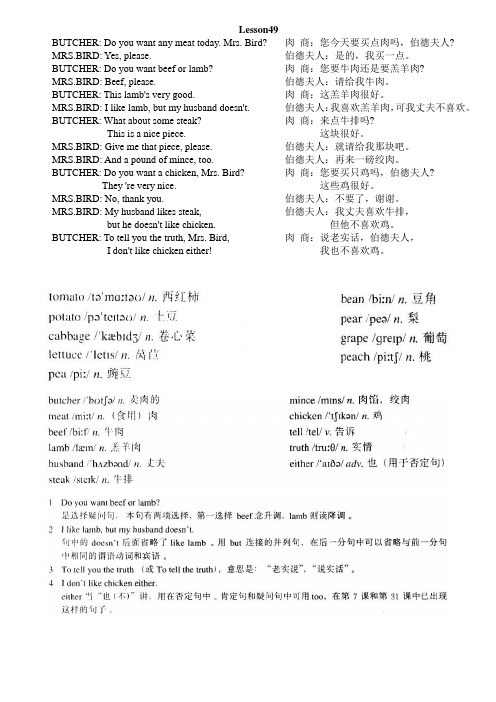
Lesson49BUTCHER: Do you want any meat today. Mrs. Bird? MRS.BIRD: Yes, please.BUTCHER: Do you want beef or lamb?MRS.BIRD: Beef, please.BUTCHER: This lamb's very good.MRS.BIRD: I like lamb, but my husband doesn't. BUTCHER: What about some steak?This is a nice piece.MRS.BIRD: Give me that piece, please.MRS.BIRD: And a pound of mince, too. BUTCHER: Do you want a chicken, Mrs. Bird?They 're very nice.MRS.BIRD: No, thank you.MRS.BIRD: My husband likes steak,but he doesn't like chicken. BUTCHER: To tell you the truth, Mrs. Bird,I don't like chicken either! 肉商:您今天要买点肉吗,伯德夫人?伯德夫人:是的,我买一点。
肉商:您要牛肉还是要羔羊肉?伯德夫人:请给我牛肉。
肉商:这羔羊肉很好。
伯德夫人:我喜欢羔羊肉,可我丈夫不喜欢。
肉商:来点牛排吗?这块很好。
伯德夫人:就请给我那块吧。
伯德夫人:再来一磅绞肉。
肉商:您要买只鸡吗,伯德夫人?这些鸡很好。
伯德夫人:不要了,谢谢。
伯德夫人:我丈夫喜欢牛排,但他不喜欢鸡。
肉商:说老实话,伯德夫人,我也不喜欢鸡。
【知识点讲解】1. Do you like... 意思是“你喜欢XX吗?”;Do you want...意思是“你想要XX吗?”所以文中第一句Do you want any meat today? 翻译为:你今天想要(买)点肉吗?2. beef or lamb,or表示选择,牛肉还是羊肉呢?3. 还记得我们之前学过第三人称单数后面的现在时态的动词要加S吗?所以表示“他喜欢牛排”应该说成:He likes steak. 如果要表示他不喜欢,则要用"doesn't"这个字:He doesn't like steak.把几种人称变化的表达形式列在下面:I like it. -- I don't like it.You like it. -- You don't like it.He/She likes it. -- He/She doesn't like it.We like it. -- We don't like it.They like it. -- They don't like it.4. a piece of, 这个量词可以用来修饰“牛排”,翻译成“一片、一块牛排”。
新概念第一册Lesson49
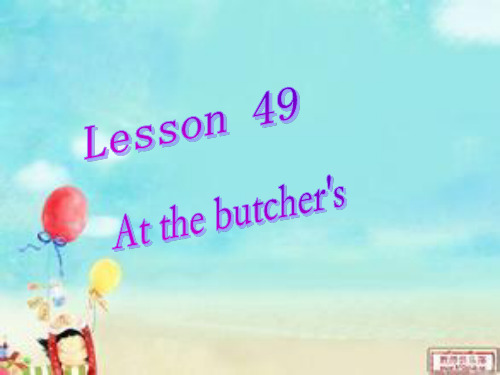
To tell her about the win. 告诉她比赛结果. You are telling me. 我早就知道这事了!
tell v.告诉,说
to tell you the truth ……说老实话 to tell the facts To tell you the truth , I don't want to tell you this . 老实说,我没想告诉你这个。 To tell you the truth, we can‟t lower the price again. 实话说,我们不能再降价了。 To be frank, =frankly, … 老实说,坦白讲
tell the truth 说真话 tell a lie说谎 tell the time “报时“ tell a story讲故事 tell about a person / a game / a success tell sb. sth./ tell sth. to sb. tell sb. to do sth. tell : 辨别,说出区别 tell A from B tell the differences between meat from lambs
e.g.: Do you want beef or lamb ? Beef , please . Lamb , please .
a lovely lamb
a wolf in sheep‘s clothing 披着羊皮的狼, 口蜜腹剑的人。 _______________________________. She's as gentle as a lamb. 她温顺的像只羔羊。 _______________________________. The life of the wolf is the death of the lamb. 有活的狼就有死的羔羊。 _______________________________. A lamb is as dear to a poor man as an ox to the rich. 穷人的一只羔羊比富人的一头牛还要珍贵。 _______________________________.
新概念一lesson49-50最全知识点
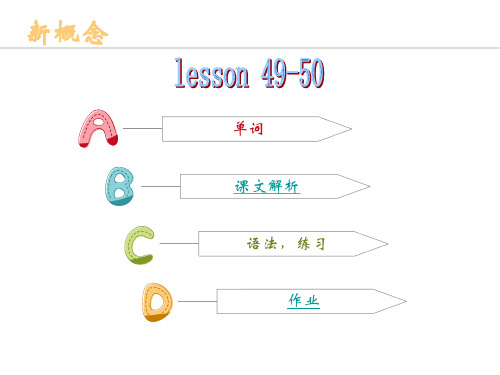
新概念
单词 课文解析 语法,练习
作业
肉类 肉类
蔬菜 蔬菜
水果 水果
we meat again
meat
!
beef
[bi:f]
steak
[steik]
lamb
S4: or • Do you want beef ↑ or lamb↓? 1.用于否定句和疑问句中.肯定句用and. 2.选择疑问句要选择其中一种答案作答 3. ↑ or ↓ or前读声调,后读降调 练习:1. Do you live in a city or a village? 2. Are you a boy or a girl?
• MRS.BIRD: And a pound of mince, too.
• BUTCHER: Do you want a chicken, Mrs. Bird? They 're very nice.
• MRS.BIRD: No, thank you.
• MRS.BIRD: My husband likes steak, but he doesn't like chicken. • BUTCHER: To tell you the truth, Mrs. Bird, I don't like chicken either!
fru:t
peə
greip pi:t∫
单词部分总结
beef,steak, lamb,mutton, fish,chicken, pork,mince
grape peach pear
Lesson49Atthebutcher's(课件)新概念英语第一册
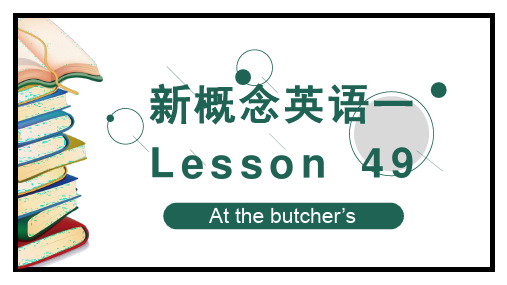
too either too either
either
Grammar- 定义
I am a teacher.
一般现在时 说明情况
I read books every day. 常做
The sun rises in the east. 真理
主语+be动词/动词+其他。
It is sweet.
主语 be动词 其他。
破擦音 清辅音 /ts/ /tʃ/ /tr/ 浊辅音 /dz/ /dʒ/ /dr/
Thank you !
What about some steak? This is a nice piece.
st ea k min ce
No,thank you.
Do you want a chicken,Mrs.Bird ? They are vere nice.
chi ck en st ea k min ce
Is he tall?
肯定句 否定句 一般疑问句
They are happy.
主语 be动词 其他
They are not happy.
肯定句 否定句
Are they happy ?
一般疑问句
I like lamb.
非三单主语 动原 其他
I don’t like lamb.
肯定句 否定句
Do you like lamb ? 一般疑问句
Does he go to school ? 一般疑问句
He likes milk.
三单主语 动三单 其他
He doesn’t like milk.
Does he like milk ?
肯定句 否定句 一般疑问句
新概念英语第一册课文翻译及学习笔记Lesson49

新概念英语第一册课文翻译及学习笔记Lesson49【课文】BUTCHER: Do you want any meat today. Mrs. Bird?MRS.BIRD: Yes, please.BUTCHER: Do you want beef or lamb?MRS.BIRD: Beef, please.BUTCHER: This lamb's very good.MRS.BIRD: I like lamb, but my husband doesn't.BUTCHER: What about some steak? This is a nice piece.MRS.BIRD: Give me that piece, please.MRS.BIRD: And a pound of mince, too.BUTCHER: Do you want a chicken, Mrs. Bird? They 're very nice.MRS.BIRD: No, thank you.MRS.BIRD: My husband likes steak, but he doesn't like chicken.BUTCHER: To tell you the truth, Mrs. Bird, I don't like chicken either!【课文翻译】肉商:您今天要买点肉吗,伯德夫人?伯德夫人:是的,我买一点。
肉商:您要牛肉还是要羔羊肉?伯德夫人:请给我牛肉。
肉商:这羔羊肉很好。
伯德夫人:我喜欢羔羊肉,可我丈夫不喜欢。
肉商:来点牛排吗?这块很好。
伯德夫人:就请给我那块吧。
伯德夫人:再来一磅绞肉。
肉商:您要买只鸡吗,伯德夫人?这些鸡很好。
伯德夫人:不要了,谢谢。
伯德夫人:我丈夫喜欢牛排,但他不喜欢鸡。
肉商:说老实话,伯德夫人,我也不喜欢鸡。
【生词】butcher n. 卖肉的meat n. (食用)肉beef n. 牛肉lamb n. 羔羊肉husband n. 丈夫steak n. 牛排mince n. 肉馅,绞肉chicken n. 鸡tell v. 告诉truth n. 实情either adv. 也(用于否定句)【知识点讲解】1. Do you like... 意思是“你喜欢XX吗?”;Do you want...意思是“你想要XX吗?” 所以文中第一句 Do you want any meat today? 翻译为:你今天想要(买)点肉吗?2. beef or lamb,or表示选择,牛肉还是羊肉呢?3. 还记得我们之前学过第三人称单数后面的现在时态的动词要加S吗?所以表示“他喜欢牛排”应该说成:He likes steak. 如果要表示他不喜欢,则要用"doesn't"这个字:He doesn't like steak.把几种人称变化的表达形式列在下面:I like it. -- I don't like it.You like it. -- You don't like it.He/She likes it. -- He/She doesn't like it.We like it. -- We don't like it.They like it. -- They don't like it.4. a piece of, 这个量词能够用来修饰“牛排”,翻译成“一片、一块牛排”。
新概念课堂笔记 第一册 Lesson 49-50

新概念英语课堂笔记第一册Lesson 49-50husband【用法】n. 丈夫【词组】husband and wife 夫妇tell【用法】v. 告诉;吩咐;讲述;辨别【词组】tell sb. to do sth. 吩咐(告诉)某人做某事tell sb (about) sth. 告诉某人(有关)某事tell sb. a story = tell a story to sb. 给某人讲故事tell the difference between A and B 分辨A 与B之间的不同truth【用法】n. 实情;真相;事实(不可数)【词组】To tell you the truth 实话说【扩展】true adj. 真实的;真正的either【用法】adv. 也(用于否定句)【辨析】also, too, either ——也also 常用在肯定句或疑问句的句中too 常用在肯定句或疑问句的句尾either 常用在否定句的句尾e.g. I also write short stories. 我也写短篇小说Do you also want to have a look? 你也想看看吗?He likes China, too. 他也喜欢中国。
Are you in Grade 3, too? 你也在三年级吗?She is not a Japanese, I’m not, either. 她不是日本人,我也不是。
My sister doesn’t like this song, either. 我妹妹也不喜欢这首歌。
meat 常用肉类名词meat n. 肉fish n. 鱼(肉)beef n. 牛肉pork n. 猪肉mutton n. 羊肉lamb n. 羔羊(肉)chicken n. 鸡(肉)turkey n. 火鸡(肉)steak n. 牛排mince n. 肉馅序数词13th~24th13th----thirteenth 14th----fourteenth15th----fifteenth 16th----sixteenth17th----seventeenth 18th----eighteenth19th----nineteenth 20th----twentieth21st----twenty-first 22nd----twenty-second 23rd----twenty-third 24th----twenty-fourthAt the butcher’s【译文】在肉店【用法】butcher 名词,“卖肉的”,表示一种传统小作坊里的手艺人,要表示他们工作的地点,就是在前面加上the,后面加上–s,要表示在这样的地方,通常用介词at。
新概念英语第一册第49课

新概念英语第一册第49课
首先,一个理想的学生应该具有良好的学习态度和积极的学习动力。
他们应该对学习充满热情,并且愿意付出努力来取得好的成绩。
他们应该有良好的学习习惯,如按时完成作业、复习课堂内容和积极参与课堂讨论等。
其次,一个理想的学生应该具备良好的沟通和合作能力。
他们应该能够与老师和同学有效地交流和合作。
他们应该尊重他人的意见,并且能够积极参与团队活动和合作项目。
此外,一个理想的学生应该具备批判性思维和问题解决能力。
他们应该能够独立思考,分析问题,并提出合理的解决方案。
他们应该具备批判性思维,能够评估信息的可靠性和有效性,并做出明智的决策。
另外,一个理想的学生应该具备良好的时间管理和自我组织能力。
他们应该能够合理安排时间,有效地管理学习和课余活动。
他们应该能够制定学习计划,并按计划完成任务,避免拖延和浪费时间。
最后,一个理想的学生应该具备积极的态度和良好的道德品质。
他们应该对学习和生活充满积极的态度,并且具备诚实、守时、尊
重他人和乐于助人等良好的道德品质。
总而言之,一个理想的学生应该在学习、沟通、合作、批判性
思维、问题解决、时间管理和道德品质等方面具备全面发展。
他们
应该是积极主动的学习者,具备良好的品质和能力,为自己和社会
做出积极的贡献。
希望以上回答能够满足你的需求,如果还有其他问题,请随时
提出。
新概念英语第一册lesson49
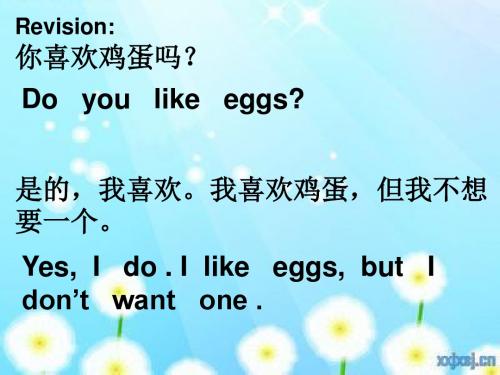
tell sb sth =tell sth to sb My mother often tells me stories . = My mother often tells stories to me .
• either adv.
My husband likes steak . I like steak too . =I also like steak . Do you like steak too ? My husband doesn't like chicken I don't like chicken either .
New words and expressions: butcher n. 卖肉者 mince n. 肉馅 meat beef lamb n. n. n. 肉 牛肉 羔羊肉 chicken n. 鸡肉 tell truth v.告诉 n.实情
husband n.丈夫
steak n. 牛排
either
beef
n.(UC)
the meat from oxen or cows
Do you want any beef ?
steak n. (UC) a piece of steak
lamb n.
(uc)
ห้องสมุดไป่ตู้
the meat from lambs
Eg: Do you want beef or lamb ? Beef , please . Lamb , please .
一般现在时 当主语为第三人称单数时 ,动词要变成单三形式 否定句要用doesn't ,后面的动词要变回动词原 形 一般疑问句用Does引导,后面的动词也要变回动 词原形
He wants some beef . He doesn't want any beef . Does he want any beef ? Yes , he does . No , he doesn't .
- 1、下载文档前请自行甄别文档内容的完整性,平台不提供额外的编辑、内容补充、找答案等附加服务。
- 2、"仅部分预览"的文档,不可在线预览部分如存在完整性等问题,可反馈申请退款(可完整预览的文档不适用该条件!)。
- 3、如文档侵犯您的权益,请联系客服反馈,我们会尽快为您处理(人工客服工作时间:9:00-18:30)。
新概念英语第一册Lesson 49笔记单词讲解:❥❥butcher ['bʊtʃə] n. 卖肉者at the butcher's 在肉店at the doctor's 在诊所at the hairdresser's 在理发店at the baker's 在面包店go to the butcher's 去肉店这里都省略了shopThe butcher is cutting the meat. 屠夫正在切肉。
The butcher's knife is very sharp. 屠夫的刀特别锐利。
❥❥meat [miːt] n. (食用〕肉(不行数名词〕pork [pɔːk] n. 猪肉I don't eat meat. 我不吃肉。
beer [bɪə] n. 啤酒❥❥lamb [læm] n. 小羊;羔羊肉mutton ['mʌtn] n. 羊肉❥❥husband ['hʌzbənd] n. 丈夫husband and wife: 夫妻exhusband: 前夫He's a good husband and father. 他是一个好丈夫和父亲。
夫妻之间的称呼:honey dear darling baby sweetheart❥❥steak [steɪk] n. 牛排a piece of steak 一块牛排How do you like your steak?你想怎样吃你的牛排?Steak rare/medium/welldone.生些/五分熟/全熟。
❥❥mince [mɪns] n. 肉馅I want a pound of mince, because I want to make some dumplings. 我想要一磅肉末,由于我想做一些饺子。
❥❥chicken ['tʃɪkɪn] n.鸡;鸡肉hen [hen] n. 母鸡cock [kɒk] n. 公鸡❥❥tell [tel] v. 告知tell sb. sth. 告知某人某件事tell the truth: 说实话tell a story: 讲故事tell a joke: 讲笑话She's telling a story to the children. 她正在给孩子们讲故事。
❥❥truth [truːθ] n. 实情true [truː] adj. 真实的;真的e true 幻想成真find out the truth 找到真相❥❥either ['aɪðə] adv. 也〔用于否认句中〕too “也〞,通常用在确定句中,有时也用于疑问句,但不能用于否认句。
放在句末而且too前常有逗号。
I like blue. You like blue, too.Do you like blue ,too?either "也“,一般用于否认句,位于句末I don't like blue either.❥❥tomato [tə'mɑːtəʊ] n. 西红柿( 复数:tomatoes)❥❥potato [pə'teɪtəʊ] n. 马铃薯;土豆(复数:potatoes)❥❥lettuce ['letɪs] n. 莴苣❥❥pea [piː] n. 豌豆❥❥bean [biːn] n. 豆角❥❥pear [peə] n. 梨子以ear 结尾的单词:dear [dɪə] adj. 友爱的clear [klɪə] adj. 晴朗的;清晰的near [nɪə] prep. 四周hear [hɪə] v. 听见year [jɪə] n. 年wear [weə] v. 穿戴❥❥grape [ɡreɪp] n. 葡萄We are going to pick grapes. 我们要去摘葡萄。
❥❥peach [piːtʃ] n.桃子; 迷人的人或事(peaches 复数〕I like your girl, she's a peach. 我喜爱你的女儿,她真是个可人儿。
课文讲解:1. Do you want any meat today? 您今日要买点肉吗?Do you want a chicken? 您要买只鸡吗?Are you...? Do you...?Are you + 非动词?Do you + 动词Are you a student? 你是同学吗?Are you hungry? 你饿了吗?Are you tired? 你累了吗?Are you happy? 你快乐吗?Are you from China? 你来自中国吗?Are you good at math? 你擅长数学吗?Are you cold? 你冷吗?Are you ready? 你预备好了吗?Do you like sports? 你喜爱运动吗?Do you have a pet? 你有宠物吗?Do you speak English? 你会说英语吗?Do you want to play with me? 你想和我一起玩吗?Do you need help? 你需要关心吗?Do you know the answer? 你知道答案吗?Do you understand? 你懂吗?Do you have any questions? 你有问题吗?Do you want to go to the park? 你想去公园吗?Are you...? Do you...?Is she/he/it...? Does he/she/it...?Is he happy? 他快乐吗?Is she your girlfriend? 她是你的女伴侣吗?Do you like Chinese food? 你喜爱中国菜吗?Does he like sports? 他喜爱运动吗?先看词性:动词or非动词再看人称:三单or 非三单三单:第三人称单数she, he ,it , Chen Tianyi, Xu Xinyu, Mr Yang, my brother, this book, the city....2. Do you want beef or lamb?您是要牛肉还是羔羊肉?这是个选择疑问句3. I like lamb, but my husband doesn't.我喜爱羊羔肉,可我丈夫不喜爱。
句中的doesn't 后面省略了like lamb。
用but 连接的并列句,在后一分句中可以省略与前一分句中相同的谓语动词和宾语。
isn't ,aren't, don't, doesn'tisn't /aren't + 非动词don't /doesn't +动词先看词性:动词or非动词再看人称:三单or 非三单He isn't tall. 他个子不高。
They aren't bad students. 他们不是坏同学。
He doesn't like tomatoes. (他不喜爱吃西红柿。
)They don't e from China. 他们不是来自中国。
They aren't from China. 他们不是来自中国。
4. What about some steak? 来点牛排吗?也可以说How about some steak?What about/How about ...?表示询问,征求意见I am an engineer. What about you? 我是一名工程师。
你呢?I like winter. What about you? 我喜爱冬天。
你呢?What about this dress? 这条裙子怎么样?What about his English? 他的英语怎么样?What about singing a song? 唱一首歌怎么样?4. To tell you the truth, Mrs. Bird. I don't like chicken either! 说狡猾话,伯德夫人,我也不喜爱鸡。
To tell you the truth( 或To tell the truth), 意思是〞狡猾说“,“说实话〞。
To tell you the truth, I don't really like tomatoes. 说实话,我不太喜爱番茄。
语法讲解:选择疑问句含有or的问句称为选择疑问句。
or之前的局部读升调,之后的局部读降调。
Beef or lamb? 牛肉还是羔羊肉?Do you have a cat or a dog? (你有一只猫还是一只狗?)Would you like tea, coffee, or milk?你喜爱茶、咖啡、还是牛奶?〔3项选择〕Is she watching TV or reading a book? (她在看电视还是读书?) Do you like coffee or tea? (你喜爱喝咖啡还是茶?)Is it a sunny or cloudy day?〔是晴天还是阴天?〕Is it a boy or a girl?〔是男孩还是女孩?〕Is it hot or cold outside?〔外面是热还是冷?〕一般现在时的单数第3人称形式在确定句,否认句以及疑问句中的表现方式如下所示:Who likes lamb? 谁喜爱〔吃〕羊肉?Mrs. Bird does. 伯德夫人喜爱。
Does Mr. Bird like Chicken? 伯德先生喜爱鸡肉吗?No, he doesn't. He doesn't like chicken at all. 不,他不喜爱。
他一点儿也不喜爱鸡肉。
Mr. Bird likes potatoes, but Mrs. Bird doesn't.伯德先生喜爱土豆,但是伯德夫人不喜爱。
I don't like potatoes, either.我也不喜爱土豆。
课堂练习:用am not, aren't , isn't, can't, don't ,doesn't 填空。
He likes coffee, but I ________.She likes tea, but he ________.He is eating some bread, but she _______.She can swim very well, but he ______.He is reading a magazine, but I ______.答案:1. don't 2.doesn't 3. isn't 4. can't 5. aren't 6. am not。
